November 22, 2022
HOLIDAYS IN CURAÇAO: TRADITIONAL DISHES TO SAVOR DURING THE DECEMBER FESTIVITIES
By: Gislainne Maria

Curaçao is a melting pot of cultures, and its culinary scene reflects just that. The island’s traditional cuisine echoes its ethnic diversity and rich cultural heritage. During the holidays, the culinary scene gets even more intriguing. Many local traditional holiday dishes are strictly seasonal. So, during the holidays, locals and tourists alike, are known to indulge in these dishes like there’s no tomorrow. Nothing compares to a Caribbean Christmas holiday in Curaçao. If you’re in Curaçao for the holidays, the following traditional holiday dishes are a must-try.
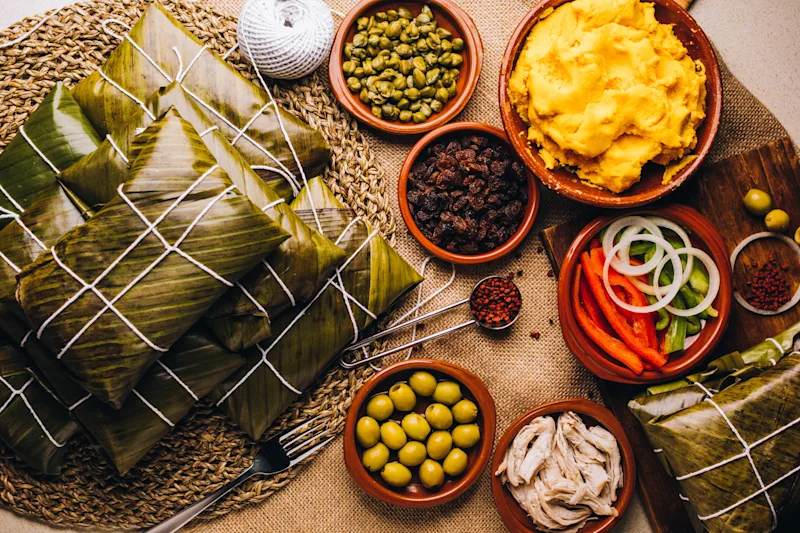
1. Ayaka
Ayakas are a staple in Curaçaoan holiday cuisine. Ayakas are not just food; ayakas are considered culinary art. Borrowed and adapted from our Venezuelan neighbors, Ayakas (or Hallacas in Spanish) are the most popular holiday dish in Curaçao. An ayaka consists of a cornmeal dough stuffed with beef, chicken or pork along with vegetables and dried fruits, folded in greased plantain leaves and tied with strings. While all families put their own twist on these cornmeal rectangles of flavor, it’s safe to say that the stuffing for ayakas usually contains raisins, prunes, olives, capers and pearl onions. The recipe for the perfect ayaka is a never-ending point of discussion for locals during the holiday season. After being assembled delicately, ayakas are boiled or steamed before serving. During the holiday season, locals are known to have a dozen ayakas stuffed in their freezer for enjoyment at any time of the day. Hands down, Ayakas are a must-try if you’re visiting Curaçao during the holidays.
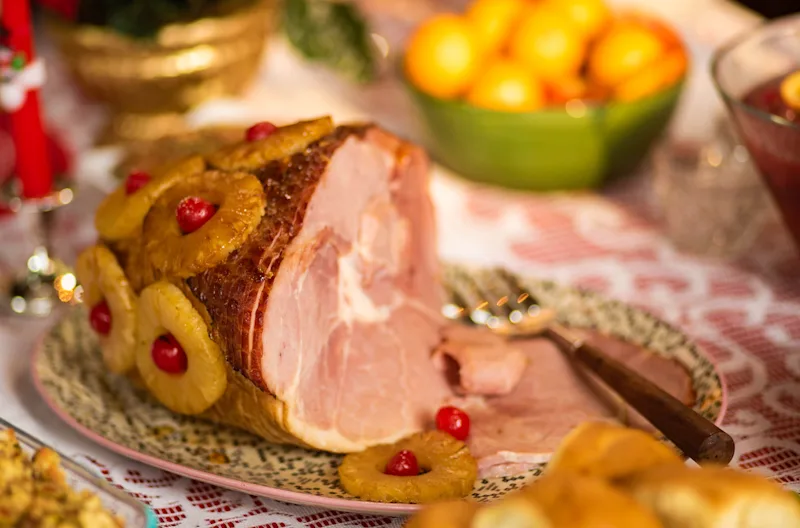
2. Ham di Pasku (Roasted Ham)
The “Ham di Pasku,” which translates to Christmas Ham, is served at every dinner during the holidays and cannot be missed. Christmas ham is an oven-roasted whole, smoked, salty and honey-glazed bone-in ham, garnished with pineapples and cloves. Sometimes the Christmas ham is also topped with canned cherries for some extra sweetness. Crispy on the outside and tender on the inside, this ham is traditionally served in slices with piccalilli on the side. As the name implies, no Christmas celebration is complete without a Christmas ham.
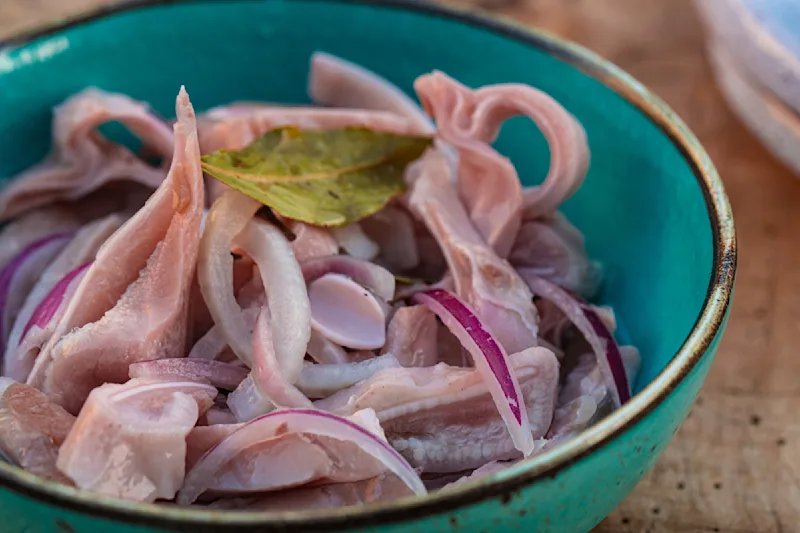
3. Sult (Pickled Pig Ears)
The pickled pig ears, or “sult” as it is locally called in Curaçao, is a holiday appetizer that locals either love or hate; there’s no in between. Pig ears mainly consist of cartilage with little protein, which is why they are boiled and soaked for hours before preparation. The salted pig ears are commonly thinly sliced in strips and soaked in vinegar and spices to further tenderize the ears. Slices of onion, peppercorn and cloves are traditionally added to the mix. Sult fanatics sometimes add bay leaves and pimento peppers to their sult also. Sult is considered best when it’s crunchy; not too tender and not too tough. If you’re in Curaçao for the holidays and you’re up for a culinary adventure, eating sult must definitely be on your to-do list.
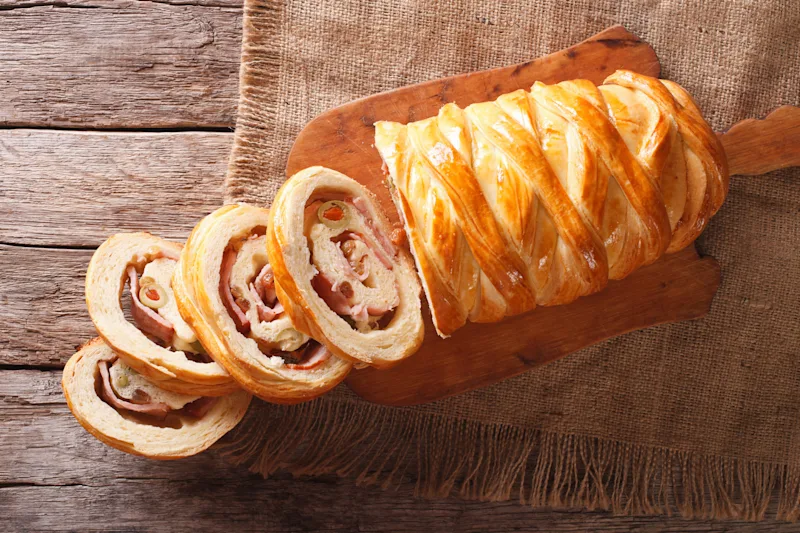
4. Pan de Jamón (Venezuelan Ham Bread)
Also borrowed from our Venezuelan neighbors, Pan de Jamón is usually sliced and served as an appetizer during the holidays. This Venezuelan ham bread is a delicately rolled bread consisting of a soft, sweet, and fluffy dough stuffed with ham, green olives and raisins. Non-conformists sometimes add bacon or cheese to the recipe for some extra flavor. This relatively easy to make bread has been a local family holiday favorite for decades and is certainly worth a try.
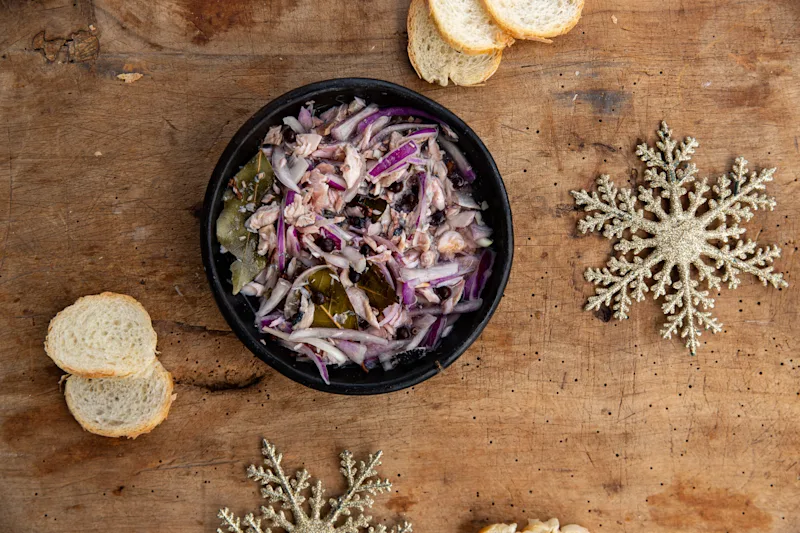
5. Pekelé (pickled, dried, and salted herring)
What’s a holiday celebration on an island without seafood? Carefully prepared with dried salted herring mixed with a perfect balance of vinegar, onions, cloves, peppercorns and bay leaves, pekelé is considered a pickled holiday delicacy amongst locals. Pekelé has a peculiar, but pleasant taste and is often served with crunchy bread to balance out the intense flavor. If you’re a seafood fanatic, Pekelé is the perfect holiday dish for you.
In Curaçao, food is taken seriously. Even more so during the holidays. These 5 delicate staple dishes have been part of the Curaçaoan holiday cuisine for decades. Not only are these dishes satisfying to the taste buds, but for many, these dishes induce some serious nostalgia. As locals start preparing for the holiday season as soon as December rolls in and Curaçaoans residing abroad rush home for the holidays from all corners of the world each year, one thing everybody can agree on despite all the holiday chaos is that it ‘tastes good to be home’.







